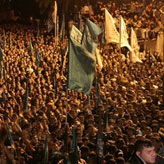Local vote embarrassing Iran president
(AP)Updated: 2006-12-19 09:30
In some cities such as Shiraz and Bandar Abbas, not one pro-Ahmadinejad candidate won a council seat, according to partial results announced by the Interior Ministry.
In Tehran, candidates supporting Mayor Mohammed Bagher Qalibaf, a moderate conservative, were on track to win seven of 15 council seats. Reformists were set to win four, while Ahmadinejad's allies had three, partial results showed. The last seat was likely to go to an independent.
Similar anti-Ahmadinejad sentiment was visible in a parallel election for members of the Assembly of Experts, a body of 86 senior clerics that monitors Iran's supreme leader and chooses his successor. Several pro-reform clerics were barred from running, but conservative opponents of the president appeared to outperform his supporters.
Along with Rafsanjani, another high-profile winner was Hasan Rowhani, Iran's former top nuclear negotiator, whom Ahmadinejad has accused of making too many concessions to the Europeans.
By contrast, Ayatollah Mohammad Taqi Mesbah Yazdi ¡ª regarded as the president's hard-line spiritual mentor ¡ª won an assembly seat. An Yazdi ally was defeated by a more moderate conservative cleric in the city of Qom.
Turnout in the local council vote was more than 60 percent ¡ª higher than the 50 per cent in the last one, held in 2002.
The "moderate conservative" camp emerged as a strong political force, positioned between pro-Ahmadinejad hard-liners and the reformists. In their campaign, they promised to improve living standards, modernize the economy and promote "competency" in administration.
Qalibaf and his supporters do not back moving closer to the United States and they oppose giving up uranium enrichment, a position shared by almost all camps in Iran.
But they oppose extreme stances that fuel tensions with the outside world and accuse Ahmadinejad of provoking the West. The moderates also tolerate less restrictive social rules on mixing of sexes and women's dress, while many hard-liners want tougher restrictions.
One moderate headed to victory, former Tehran police chief Morteza Talai, was popular among reformers because his forces did not crack down on the few anti-government protests that have occurred at universities during Ahmadinejad's presidency.
Political analyst Mostafa Mirzaeian said Iran's political lineup was moving toward "a coalition between reformers and moderate conservatives.
Among the apparent victors in Tehran was Massoumeh Iftikhar, who served as Iran's first female vice president during the term of pro-reform President Mohammad Khatami..
Khatami was elected in 1997 and reformers gained control
of parliament soon after.

 | 1 | 2 |
|
||
|
||
|
|